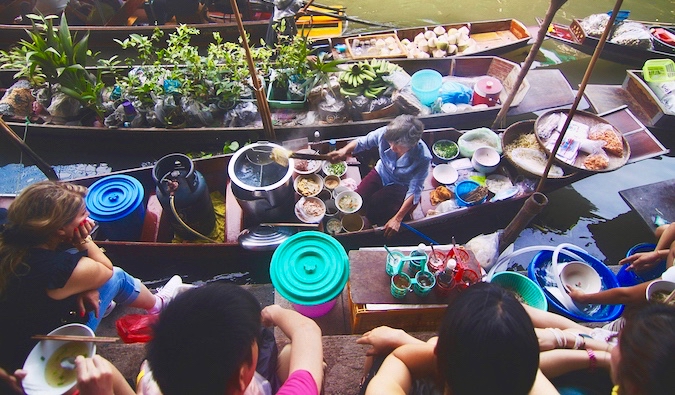
Posted: 6/26/17 | June 26th, 2017
For about the last year or so, the term “experiential travel” has been batted around the industry like a ping-pong ball. The term has actually been around longer but it’s only recently that it’s become, like Hansel in Zoolander, “so hot right now.”
The idea behind “experiential travel” is that it’s a way to get travelers closer to the local culture and population. As Wikipedia says, “The goal is to more deeply understand a travel destination’s culture, people, and history by connecting with it, more than just by visiting it.”
In part, it sells the idea that you’re a “real traveler” and not a tourist. You take part in programs and activities that help you experience the place and people, get you off the beaten path, see more than the main sights and attractions.
The term is S T U P I D.
It’s pure marketing bullshit.
Everything about the way “experiential travel” is marketed bothers me. The term makes travel sound like a superficial activity: you fly in, do some “experiential” stuff, and fly out. It makes it seem like you can experience local culture like you do a gardening class.
“Look, honey! We’re doing it like the French do. Isn’t this cool?! Wait to the folks back home hear about this!”
I mean what is experiencing the world, a course you get off Groupon?!
Of course, travelers have always bought “experiences,” like bungee jumps, walking tours, dives, safaris, cooking classes, cultural exhibitions, etc.
We all want local experiences when we travel.
We want to live our inner Indiana Jones and Bill Bryson, have those funny stories of serendipity and chance encounters, and, as Rolf Potts says, to “walk until something interesting happens.”
I think people wanting to go deeper is A GREAT THING. I don’t think we should treat travel as a checklist and I love the growing interest people have in experiencing more (hence the popularity of the sharing economy, volunteering, and service-based trips).
BUT don’t be seduced by the fancy marketing of big brands and magazines trying to pitch you “experiences.”
The industry is realizing that people, especially millennials, want to have more than a list to check off — and want a slice of that pie by promising travelers an “authentic experience” — as long as they are willing to pay for it.
And this is what really bothers me.
It’s not the experiences they are selling — it’s the flashy marketing, empty promises, and high prices that come with the term. It is just a way to get consumers to pay more for packages and overpriced activities.
Heck, there was even a cruise line that would take you to places in the Caribbean to volunteer.
Do some good between the buffet and nightly show, right?
Just like the industry convinced people to pay more for “green travel” (which wasn’t), it is doing the same with everyday “experiences” so you can part with more of your money while getting a superficial feeling of accomplishment and adventure.
(The industry website Skift even did a report on how companies and tourism boards packing and selling experiential travel.)
You know what I call “experiential travel” and getting to know another place and its culture?
TRAVEL.
That’s it. No more words need to be added.
When you travel, you (ideally) do more than just see the major sites, capture photos for Instagram, or check off lists: you eat the local food, soak up the local culture, take public transportation, and talk to people.
If you want to get closer to a place and understand it, talk to the people who live in your destination. Pick up a book, read a newspaper to learn about current events (and definitely read the editorial section), stumble across an outdoor street party, learn the local language, visit street markets, or hitchhike.
I learned about life in Lyon last month — not on some highly packaged and pricey experience but through walking around, taking local transportation, being friendly, talking to residents, using the web to find meetups, trying lots of food, and learning some history. I watched people. I asked questions. I got lost.
I did the same thing travelers have been doing for centuries before someone put a name — and a price tag — to it.
I’ve been a huge advocate of the sharing economy. It’s an affordable way to have unique experiences, meet locals, and get to know a place and its people.
Meetup.com, EatWith, Couchsurfing, and Airbnb — they all exist to bring locals and travelers together and bypass the traditional travel gatekeepers.
I love them and am a frequent user of them. I ended up spending the day with my EatWith host in Lyon, who showed me his neighborhood and ended up taking me to an underground hip hop Jazz show.
If you want to experience a place, do what people have done for ages and just travel. Avoid the flashy terms, seductive marketing, and any trip using the term “experiential travel.” It’s simply a way to sell you something you could do on your own at a much higher price.
Book Your Trip: Logistical Tips and Tricks
Book Your Flight
Find a cheap flight by using Skyscanner. It’s my favorite search engine because it searches websites and airlines around the globe so you always know no stone is being left unturned.
Book Your Accommodation
You can book your hostel with Hostelworld. If you want to stay somewhere other than a hostel, use Booking.com as it consistently returns the cheapest rates for guesthouses and hotels.
Don’t Forget Travel Insurance
Travel insurance will protect you against illness, injury, theft, and cancellations. It’s comprehensive protection in case anything goes wrong. I never go on a trip without it as I’ve had to use it many times in the past. My favorite companies that offer the best service and value are:
- SafetyWing (best for everyone)
- Insure My Trip (for those 70 and over)
- Medjet (for additional evacuation coverage)
Want to Travel for Free?
Travel credit cards allow you to earn points that can be redeemed for free flights and accommodation — all without any extra spending. Check out my guide to picking the right card and my current favorites to get started and see the latest best deals.
Need Help Finding Activities for Your Trip?
Get Your Guide is a huge online marketplace where you can find cool walking tours, fun excursions, skip-the-line tickets, private guides, and more.
Ready to Book Your Trip?
Check out my resource page for the best companies to use when you travel. I list all the ones I use when I travel. They are the best in class and you can’t go wrong using them on your trip.


